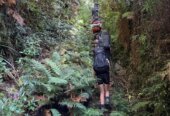
Images via Wikimedia
By Peter Carr
During the past week I have spent time in the South Island making presentations from Mosgiel in the south to Nelson in the north. Four planes, six meetings in all and time to talk with people as to how they perceive life.
Firstly, Christchurch traffic aside, it is much quieter down there. An interesting observation was the paucity of trucks on State Highway One. The people have to eat yet one wonders how the supermarket produce gets to them. Given that some food is grown locally the more packaged items will be sourced from the North Island.
Putting aside the slow journey time of the railway industry, and associated treble handling, it is clear that the swifter road and ferry deliveries are the way to go. But between Timaru and Christchurch the middle of the weekday road was strangely quiet.
Interestingly, large acres of oil-bearing Canola were very evident.
In Dunedin the retired people I spoke with are bemoaning the high rates increase that Dunedin City Council is set to impose. There were expressions of horror at the huge increase announced by the Otago Regional Council.
At Timaru there was much discussion on the announcement the council intended to leave their national industry membership group – Local Government New Zealand over the Three Waters issue.
Imagine my horror at receiving a copy of the July (yes July) formal agreement between LGNZ and the government making the Three Waters issue a done deal. Our Mayor Jim Mylchreest, who sits on the LGNZ Board, was very much against this document as he can clearly see that waiting in line for a new water pipe or sewage expansion opportunity will have to be measured against a stormwater drain for Bluff or other items from all over the country.
Like it or not, you have been sold down the drain (no pun) and your mayor has fought hard to maintain the status quo. Recent major additions to fresh water supply in both main Waipā towns would not have been accomplished in a timely fashion, by a lengthy centralised decision-making body.
There are a number of good and proper initiatives in Māori dominant areas where health, housing and crime issues are giving cause for concern. In a district that houses the country’s largest prison we, in Waipā, should also be concerned that a high number of the residents have major difficulty with the act of reading.
No doubt by the time you read this on Thursday the regional picture regarding Covid may have changed, hopefully for the better.
There is clearly a lunatic fringe at work where the total abstinence of respect for health-saving borders is spreading the unwelcome virus. I am tired of having arrangements, including a much-needed holiday, cancelled. Sadly, the vaccination deniers who are medically capable may well find themselves as social pariah outcasts – both in their home areas and in the public arena.








